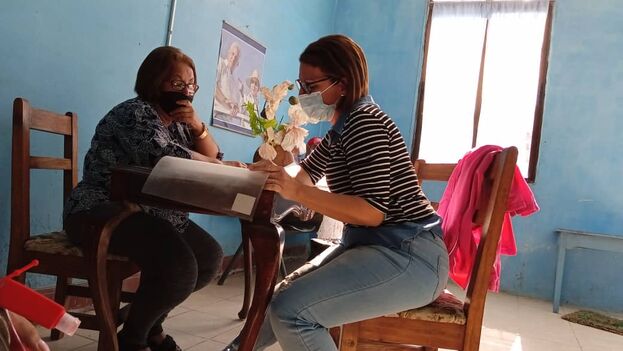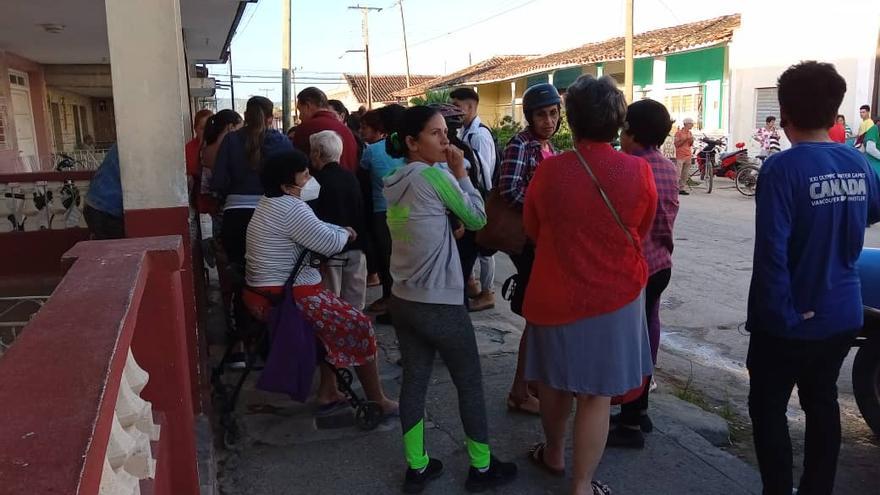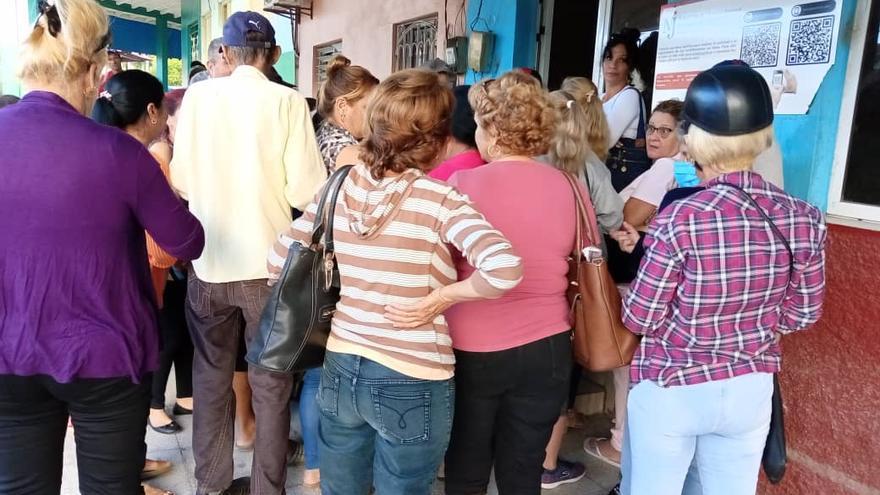
![]() Yankiel Gutiérrez Faife, Camajuaní | 14 February 2023 — The peace of a small town like Camajuaní, in Villa Clara, is only disturbed for three reasons: partying, surprise supplies in hard currency stores and the queues at the paperwork offices. The most extensive is the one that is organized every morning in front of the Directorate of Identification, Immigration and Aliens, in the vicinity of the Police unit, although those of the Civil Registry and other dependencies of the Ministry of Justice have nothing to envy.
Yankiel Gutiérrez Faife, Camajuaní | 14 February 2023 — The peace of a small town like Camajuaní, in Villa Clara, is only disturbed for three reasons: partying, surprise supplies in hard currency stores and the queues at the paperwork offices. The most extensive is the one that is organized every morning in front of the Directorate of Identification, Immigration and Aliens, in the vicinity of the Police unit, although those of the Civil Registry and other dependencies of the Ministry of Justice have nothing to envy.
Spain’s Democratic Memory Law – called the “law of grandchildren” – triggered requests for documents and caused a deficit of stamps at the national level to which Camajuaní was no stranger. But the real difficulty in small municipal offices is being able to attend to the large number of requests that are made with very few personnel and even fewer technological resources.
Located on Raúl Torres Street, the Camajuaní Civil Registry sees applicants arrive almost at dawn. “We cannot serve everyone. There are too many orders and we can only collect ten cards per day,” explains Migdalia, one of the local workers.
Stunned by the accumulated requests, Migdalia tries to calm things down in the queue and expedite the procedures. “If they don’t suspend the ‘law for grandchildren’ soon, we’re going to go crazy or we’re going to ask for a leave. I can’t sleep without taking my nerve pills,” she laments.
The line can be organized first thing in the day or “inherited” from the night before. A calculated business of coleros and “friends” keep turns to have guaranteed entry to the office when morning comes. There are even private “guardians” who ensure order and take turns watching at dawn.

“Lists until March 18 are already in place to collect the documents in the registry,” says Miriam, a primary school teacher who has to give all kinds of excuses at work to go out and line up. “Those of the corrections, on the other hand, are already organized until April 11.”
The uproar of the applicants is such that the neighbors have filed numerous noise complaints and, in some cases, have thrown buckets of water from the doorways of their houses during the night to dissipate the noise and be able to sleep.
In theory, all the necessary documents can be requested electronically. The Ministry of Justice provided a digital form which should facilitate the process. But the reality is quite different.
“Civil Registry forms have been available on the Ministry of Justice website for a year,” explains Yanet, a shop assistant at the nearby freely convertible currency (MLC) store. “At the time, this measure managed to speed up the process and stop the queue. However, today it’s one more obstacle. Everything is slower. What I could solve in three or four days before, now I can’t even do it in a week”, she points out.
“People are already very upset. The situation is the same in all offices. Very slow, and when they finally give you the documents, they always have errors and you have to start the process all over again. It’s a never-ending story”, complains Anabel, a housewife. “The most common justification is to say that this whole situation with the ‘grandchildren’s law’ is unforeseen, since they did not plan it. But people are not to blame for that.”
“People are already very upset. The situation is the same in all offices. Very slow, and when they finally give you the documents, they always have errors
Jamikel, a young man from Santa Clara, had to request paperwork in Camajuaní for his father, who spent a week lining up, but to no avail. He intended to request a verbatim copy of certain documents. When it was finally his turn to pick up the papers, and after a twenty-mile drive and seven-hour wait, the officials told him that he had done everything wrong and that he had to reactivate the application. His son then helped him complete the online process. “We’ll have to see if he’s got better luck this time,” says Jamikel.

The other option the elderly and those who do not have smartphones have is to go to the Youth Computer Club of the town, where a technician will help the interested party when requesting documents. Even if the effort does not produce results, the 10 pesos fee for each request is still due and payable.
Some have suggested that the Ministry of Justice offer the option of reviewing the document in PDF format before picking it up. The applicant could then verify it and, if there is an error, request the correction by e-mail. “But no. They prefer for everything to have obstacles and to complicate everything”, says Alicia, Yanet’s partner at the MLC store.
To make matters worse, the delivery of documents follows a rigid but inefficient order: Mondays, Tuesdays and Fridays are for regular processing, Wednesdays for corrections, and Thursdays for those who need documents related to agriculture. Altogether, they only deal with thirty collection requests per week, while on Wednesdays ten additional files are received for corrections, and on Thursday another ten for procedures related to agriculture, which are resolved more quickly, for a total of fifty.
“Then one has to hear Díaz-Canel talking about eliminating bureaucracy, but they create more. Everything is hypocritical and disrespectful”, Alicia insists. “It seems unbelievable that the Ministry of Justice is one of the main defaulters of delivery deadlines.”
Miriam, a woman from Santa Clara who tried to evade mistreatment and bullying at the Santa Clara Civil Registry, finds herself in a similar situation and has not been able to process a document that she has been looking for since October. “The birth registration is supposed to be in Colón, Matanzas, but that civil registry is not even in the digital application system”.
The situation of the Civil Registry offices in other towns in the province is just as precarious. Vueltas, a few kilometers from Camajuaní, is part of its jurisdiction. The workers review the procedure code, previously assigned by the website of the Ministry of Justice. Then, within a month or two, they print the documents and call the interested party to get their turn in the queue to pick them up.
As for Remedios, a neighboring municipality of Camajuaní, the stagnation is similar. Both the list to carry out the procedure as well as the list of corrections will not be complete until the month of April.
____________
COLLABORATE WITH OUR WORK: The 14ymedio team is committed to practicing serious journalism that reflects Cuba’s reality in all its depth. Thank you for joining us on this long journey. We invite you to continue supporting us by becoming a member of 14ymedio now. Together we can continue transforming journalism in Cuba.
